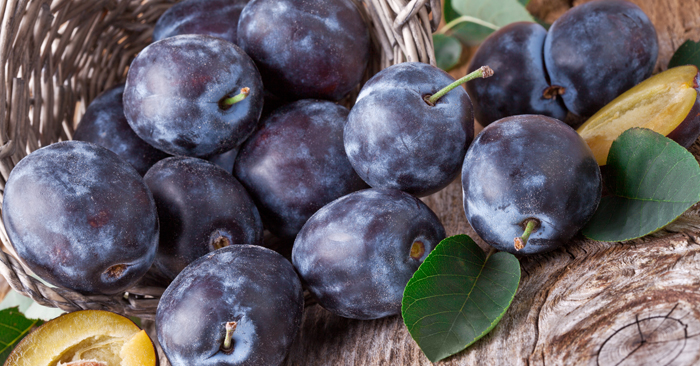We regularly publish some great healthy living tips, new recipes and other Prune tidbits on our blog
Prune Facts
Suffering from ‘tummy trouble’ and a sluggish digestion? Prunes can help!
Posted Fri, Jun 11, 21 by Sunsweet
For whatever the reason, when the digestive system gets out of whack the entire body can start to feel its effects. Lethargy. Bloating. Sluggishness. And even some pretty acute pain. There's good news, though. A sluggish digestion doesn't have to be endured, as just 'one of those things'. There are lots of tips for you to try, here. And the even better news? They're easy!

The discomfort and inconvenience of suffering from digestive problems, especially when you have previously been able to take a healthy digestive system for granted, can be tough to handle. There are lots of different factors that can affect digestion; from experiencing busy and stressful periods in your life, to hormonal changes triggered by pregnancy, to the natural and inevitable physical changes that go hand in hand with the aging process. Whatever the reason, if the digestive system has become chronically sluggish the entire body can wind up feeling below par, as a result.
The aging process
Digestion problems can crop up at any life stage and at any age. But according to the online medical resource, WebMD almost 40% of older adults have at least one digestive issue annually. Constipation is one of the more commonly-cited digestive complaints and with sufferers experiencing symptoms like the ones listed below, it really is no joke:
- Reduced frequency of bowel movements
- Sensations of sluggishness and bloatedness
- Painful bowel movements
- Increased risk of developing piles
Common conditions
Constipation can be caused by a whole host of factors including age-related changes in the digestive system, medication and the effects of undertaking reduced levels of physical activity and not drinking adequate fluids or eating enough fibre.
Gastroesophageal Reflux Disease – a condition that can be responsible for causing unpleasant and even painful symptoms like heartburn - is pretty common, too. The condition can be exacerbated by eating rich foods, by eating late at night and by generally eating too much because being overweight can be a trigger for the onset of the condition's symptoms.
As you age, it's important to schedule regular health checks with your doctor to discuss any symptoms that might worry you. And, of course, any sudden changes in your body should always be thoroughly investigated by your GP. As with many issues, though, preventing digestive problems – before they become chronic - is far preferable to having to treat those issues medically.
Now for the good news!
And there's some good news. Because simple and common-sense steps like maintaining a healthy weight by eating well – choosing a diet with plenty of fibre and fluids, for example - and exercising regularly are excellent starting points. Having a good understanding of the digestive basics – like opting for gut-friendly foods - can go a long way towards nipping potential problems in the bud, too. Here are our top 3 digestion-boosting tips for you to try. And they really couldn't be more simple. You can check out a more comprehensive list of easy, digestion-boosting tips, here. And there's even a whistle-stop tour of the digestive system, too!
- Mindfulness at mealtimes: sit up at the table, switch off your phone and savour your food.
- Drink plenty: water, herbal tea and fruit juices are all good choices. Avoid ice-cold drinks at mealtimes, though, they can make digestion sluggish.
- Snack on prunes: they're sweet, super-tasty and a source of fibre and sorbitol.
Here's to maintaining good digestive health, whatever your age!
Please Note: Prunes are good for digestion and help keep you regular, when 100g are eaten as part of a varied and balanced diet and an active lifestyle. Always consult a GP if you have any health concerns.
The not-so-skinny on sugar
Posted Fri, Jun 11, 21 by Sunsweet
Sugar. It's something that we should all be attempting to cut back on. But does that mean that we have to cut back on fruit, too – like prunes – that make a sweet and tasty contribution towards our 5-a-day? What does the science say, are all sugars created equal?

The introduction of a sugar tax
World Health Organisation (WHO) guidelines recommend that we eat around 25 grams of sugar each day - about 6 teaspoons. But consumption in most countries exceeds this. Currently, Western European adults consume an average of 101 grams of sugar per day ….. that’s about 25 teaspoons!
In a Euromonitor study, Germany was ranked the second-most sugar-loving nation in the world with people eating 103 grams on average. In Ireland, which ranks fourth on the list, sugar intake falls just short of 97 grams, the UK comes in seventh at 93 grams and the Italians consume 57 grams per day.
With rising obesity levels on a European and global level being blamed on an over-reliance on energy-dense foods, several countries have called for the introduction of measures to help curb the intake of sugary foods; health warnings, sales taxes, banning junk foods in schools, restrictions on advertising to children and reduced portion sizes among others.
Variations on a sugar tax have already been introduced in Denmark, France, Finland, Hungary, Mexico and India. As recently as March 2016, the British Chancellor, George Osborne, made the decision to introduce a tax on sugary drinks. Moves like these have been welcomed by those with a keen professional interest in the topic. Chris Askew, for example, chief executive of Diabetes UK said: “We have been campaigning for this... as we are all consuming too much sugar."
But what's so bad about sugar?
Sugary foods and drink products that are high in refined sugars may be calorie-rich, nutrient-poor and contribute towards health issues like tooth decay and weight gain. According to advice from WHO, being overweight can lead to:
- Heart disease
- Diabetes
- Musculoskeletal disorders (especially osteoarthritis)
So what about the naturally-occurring sugars in fruit, like prunes?
Well, prunes are simply dried plums. One plum becomes one prune, just with the water removed, so that the calorie content remains the same. They contain the same natural fructose, glucose and minimal sucrose sugar content as their fresh counterparts. Having only low levels of sucrose is a bonus because sucrose is the fruit sugar that bacteria utilise to produce harmful acids and dental plaque. Additionally, you often see sorbitol as an active anti-plaque ingredient in chewing gum. But, of course, the sorbitol that prunes contain occurs naturally!
Prunes are whole fruit so can contribute towards achieving your 5-a-day, as well as boosting your daily fibre intake. They can make a really useful addition to a healthy, balanced diet. And recent research indicates that prunes do not negatively effect weight. Because, as with all fruit, prunes appear to help with satiety - feelings of fullness - which is an important factor in controlling overeating and making healthy choices.
Common Perceptions: True or False
- Prunes are full of sugar: False
- Prunes contain no added sugar. During the plum-prune drying process, sucrose is hydrolysed to glucose and fructose so prunes contain minimal sucrose: True
- Prunes are harmful to teeth because dried fruit sticks to the teeth and increases the risk of caries (tooth decay): False
- Prunes contain significant sorbitol which is non cariogenic: True
Sugar-Free Month
So, what do you think, could you take the challenge to limit your intake to just naturally occurring sugars for a month? We'd love to hear how you get on. Good luck!
And why not take a moment to discover more of the nutritional facts about Sunsweet prunes, here?
Please Note: Prunes are good for digestion and help keep you regular, when 100g are eaten as part of a varied and balanced diet and an active lifestyle. Always consult a GP if you have any health concerns.
The Top 6 Questions We’re Asked About Prunes
Posted Thu, Feb 27, 20 by Sunsweet
Everything you ever wanted to know about prunes – and, quite possibly, a little bit more besides - all in one place! Check out our official, super-informative Q&A on all things Sunsweet prune-related. The Top 6 Questions We’re Asked About Prunes.

- Are prunes gluten-free?
- Are prunes suitable for people with diabetes?
- Do prunes contain sugar?
- What effect do prunes have on the digestive system?
- What is the connection between prunes and strong bones?
- And, our favourite, just how exactly does a plum become a prune?
Reports suggest that – for a whole host of reasons - as many as one in four of us are now attempting to live gluten free. Gluten is the protein that is found in grains like wheat. And with things like bread, pasta and cereal being such a staple of everyday meal planning, going gluten free isn’t easy. But the good news? All fruit is naturally gluten free and so a serving of prunes or a glass of prune juice can be enjoyed whenever you like. You can even add them to your favourite coeliac-friendly recipes to give them a sweet and fruity twist.
Experts recommend that to keep blood sugar levels steady, we aim for a diet with an overall GI of 50 or less. But, happily, that doesn’t mean that sweet and tasty snacks like Sunsweet prunes are a no-no. Harvard Medical School found that the GI of pitted prunes is around 29 making them a low-GI fruit that doesn't dramatically affect blood sugar and insulin levels.
Prunes contain no added sugar. They are simply dried plums: one plum becomes one prune, just with the water removed. During the plum-prune drying process, sucrose is hydrolysed to glucose and fructose so prunes contain minimal sucrose. And prunes are classed as whole fruit so they can contribute towards achieving your 5-a-day, as well as boosting your daily fibre intake.
For centuries, prunes – and prune juice - have been associated with good digestive health. But now there are scientific findings to support that association, too. Research has shown that - when 100g of prunes are eaten daily, as part of a varied and balanced diet and an active lifestyle – they can assist with normal bowel function just as much as fibre supplements. In fact, prunes should be considered as a first line therapy when it comes to maintaining a healthy bowel.
Research suggests that prunes, due to the nutrients they provide, could be beneficial for bone health. Prunes contain vitamin K and manganese that - among other functions - have direct benefits for bone health. Prunes are also a source of vitamin B6 which helps make healthy blood cells in our bone marrow and maintain normal hormone levels including those involved in bone health.
It’s simple, really. Sunsweet prunes are a special variety of sun-ripened plums that have been dried to remove some of the water. A variety with an exceptionally high sugar content, these "Improved French" variety of plums give Sunsweet prunes their distinctively delicious taste; rich and fruity with notes of creamy vanilla. The dried fruit contains similar levels of nutrients – such as fibre - to fresh plums, while offering the added benefit of year-round availability and a long shelf life.
Please Note: Prunes are good for digestion and help keep you regular, when 100g are eaten as part of a varied and balanced diet and an active lifestyle. Always consult a GP if you have any health concerns.
The top three nutritional reasons to keep loving prunes this season
Posted Fri, Jun 11, 21 by Sunsweet
Did you know that there are lots of compelling reasons why prunes should be top of the class, and not just at back-to-school time? Not convinced? Well, here are our top three seasonal reasons why you – and your family - should be making friends with prunes!

Understandably, you may be reluctant to kiss goodbye to the summer. But, no matter what your life stage, the autumn is an excellent opportunity to embrace that back-to-school feeling, in whatever way you and yours can this year. September is the perfect time of the year to get back to basics, from a health and fitness point-of-view. And, guess what, prunes are a great place to start!
The top three seasonal reasons to love prunes
- You can give your immune system a fighting chance to keep all of those annoying autumnal bugs at bay … with prunes! The dried fruit is a rich source of vitamin B6 and copper, both nutrients are able to help to support a healthy immune system.
- The holiday suitcase is back on top of the wardrobe for another year, the nights are getting longer, darker and colder so it’s not uncommon - or indeed surprising - for your energy and motivation levels to start to take a downward turn. But did you know that prunes can help? Vitamin B6 - which we mentioned above - can help you to feel less tired, it also supports the normal release of energy from foods and the transportation of iron in the body. Copper and manganese – both of which are found in prunes – assist in some of these functions too.
- Prunes have lots of heart health benefits. They’re naturally saturated fat free and reducing the consumption of saturated fat helps to maintain normal blood cholesterol levels. They’re naturally salt-free, too, and reducing the intake of salt helps to maintain normal blood pressure.
There really is a lot to love about prunes!
Want to find out more? Take a look at our online guide to the health-boosting properties of prunes or check out our FAQ
On a more serious note…
Scientific research has been undertaken into the role that prunes can play in potentially helping to prevent serious illness. And a recent study found that eating prunes regularly, may help to reduce the risk of developing bowel cancer.
Professor Dr Nancy Turner Texas A&M University said: “Through our research, we were able to show that dried plums promote retention of beneficial bacteria throughout the colon, and by doing so they may reduce the risk of colon cancer.”
According to the NHS, bowel cancer is one of the most common types of cancer diagnosed in the UK.
That back-to-school feeling
The daily ‘little break’ and ‘big break’ for kids, and adults, are always a challenge but don’t overlook the snacking potential of prunes. With no added sugar, prunes are naturally sweet. And, let’s face it, which child isn’t on the hunt for something sweet the second they walk in the door?! Negotiating playground and office politics is hungry work after all!
Enjoyed straight from the pack, included in the family’s favourite bakes or whizzed into a smoothie, prunes make the perfect lunchbox filler or healthy after-school treat.
You can check out our delicious smoothie recipe suggestions, here:
Please Note: Prunes are good for digestion and help keep you regular, when 100g are eaten as part of a varied and balanced diet and an active lifestyle. Always consult a GP if you have any health concerns.





